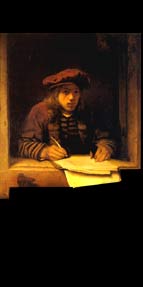 |
 |
 |
 |
 |
|
| Interview |  |
|
Jean-Pol Fargeau: It's been eight years since "Les Amants du Pont-Neuf."Where did you go?
Leos Carax: To hell.
Jean-Pol Fargeau: After three films based on original material,you're now adapting a novel. Why?
Leos Carax: My first three films weren't "original subjects!"On the contrary, they were three variations on the least original theme possible:"Boy Meets Girl".Original subjects often make very bad films, that are falsely original.
Jean-Pol Fargeau: How did you discover Herman Melville's "Pierre, or the Ambiguities"?
Leos Carax: At the age of 19 or 20, through my friend Elie Poicard.I immediately thought "this is my book."Like Dumas' "Twenty Years After" or "The Vicomte of Bragelonne " during my childhood... or "The Magic Mountain" during adolescence...or some books by Céline and James' "The Wings of the Dove" in later years.But "Pierre" more than any other.I would reread it every five years or so.That doesn't mean it's a book I understand.Otherwise I would never have considered turning it into a film.I perceive "Pierre" in the same way that I perceive my own life:I understand both "poorly" but I'm obliged to explore them.That's what a project is: a heavy question mark.You're the dot under that mark and you mustn't let it crush you.
Jean-Pol Fargeau: At the heart of the book, there's this extraordinaryrelationship between a brother and a sister, Pierre and Isabelle.
Leos Carax: Between a brother and a "maybe sister".But my first films were all on the theme "a boy meets a sister".The girl or the woman was less a real lover than a "soul sister" ...a soul, or almost a ghost.Nothing touches me more than the word "sister".In "The Man Without Qualities", Robert Musil describes the relationshipbetween Ulrich and Agathe as "the last possible love".That's also how I see Pola X".
Jean-Pol Fargeau: Incest?
Leos Carax: It's the relationship with what seems to have become impossible.The reunion with part of yourself that you thought was lost for good or permanently hidden.Isabelle or Pierre, there's no difference.
At one point, I even considered calling the film "Pierre; or, Isabelle".Or "The Lost Presence".
Jean-Pol Fargeau: How have you "adapted" the novel?
Leos Carax: You don't adapt novels but rather the enduring sensationthat they leave you with.There's one thing that people rarely talk about and yet is vital in our lives: dreaming.I don't mean night dreams but daydreams.They are man's best companion, wonders of existence.Thoughts often travel through them and then settle.Reading also does this: the eyes leave the page for a secondand we're off on a thousand journeys, a thousand projects.That said, a film isn't a dream. But at the origins of a film, there is this feeling,like "déjà-vu", like "a memory of the present".Then, through the writing and shooting stages, you investigate this feeling of "déjà-vu".
Jean-Pol Fargeau: In the novel, Isabelle comes from France.In your film, she is from Eastern Europe, probably the Balkans.I learnt that you yourself went there several times during the war.
|
|
|
|
